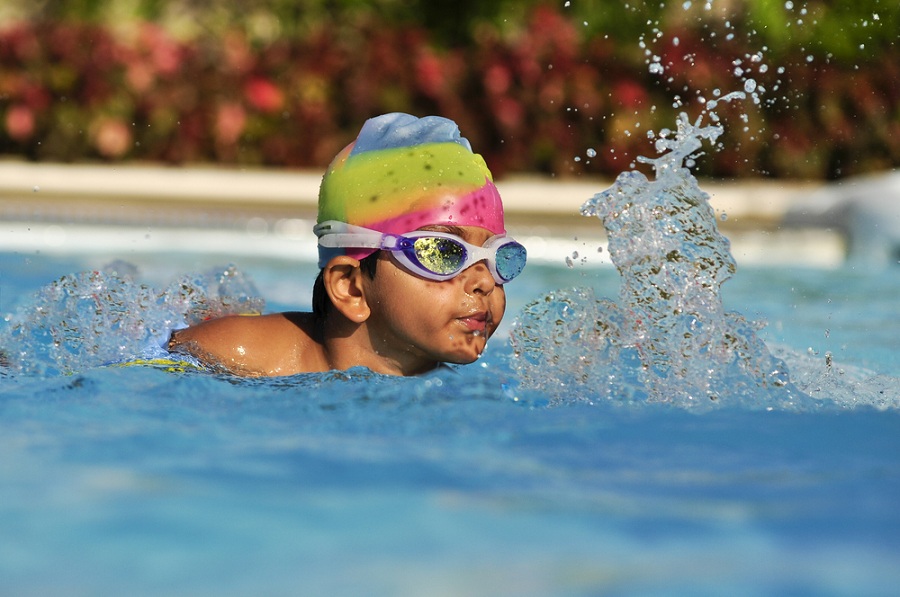How do you keep your kids’ swimming pool clean?
What are the most important items to attend to? And how frequently should you do it?
These are important questions, especially since most parents don’t have much free time.
In this guide, we’ll cover some tips learned the hard way – both in our experience as pool insiders and our own experience raising kids.
To save you time, we’ll cover the most important things to do first, then work our way down the list to more optional tasks.
1. Maintain a Healthy pH Level
Keeping your pool’s pH level between 7.0 and 8.0 is essential for keeping your kids’ pool clean.
This means that the water should be slightly alkaline. If the pH level is too acidic, algae and bacteria will grow quickly.
To maintain a healthy pH level, add a little baking soda to the pool every week.
Baking soda neutralizes acidity in the water, so adding it regularly keeps your pool’s pH level balanced.
2. Use An Automatic Pool Cleaner & Skimmer
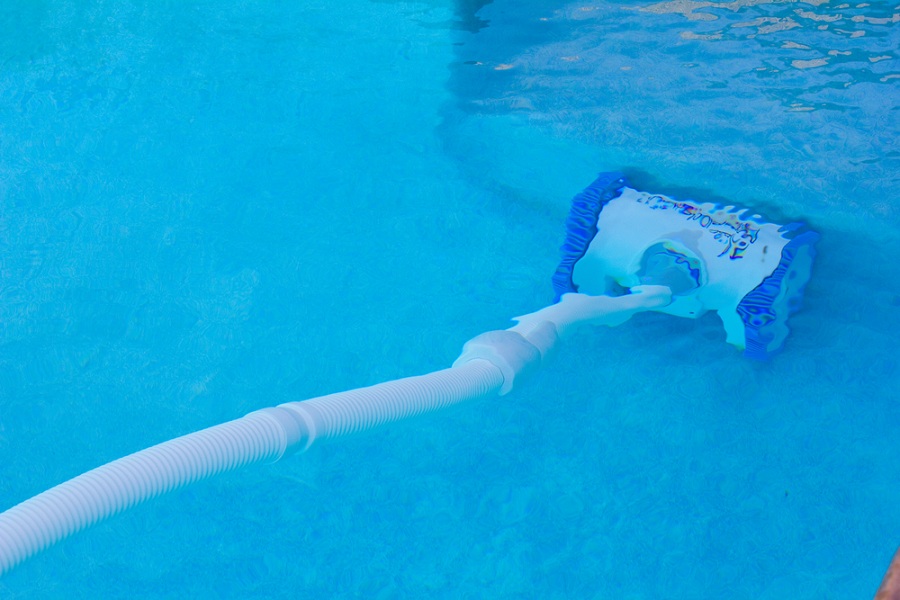
Installing the right automatic swimming pool cleaner and pool skimmer is one of the easiest ways to keep your kids’ pool clean regularly.
Swimming pool cleaners come in a wide range of prices, three basic types, and are designed for different kinds of debris.
Most automatic pool cleaners are made of plastic, metal, and rubber. They may use wheels, tracks, or water jets to push them over the floor and walls of your pool while brushes and water pressure loosen grime and debris and some form of water vacuum system sends the dirty water into the input side of your pool filter to remove it.
Robotic pool cleaners are the most expensive but also the cheapest & easiest to operate because they don’t rely on high-power pumps. Instead, they use 12V or 24V motors to handle the work.
Suction-side pool cleaners rely on your pool pump to vacuum debris directly from the bottom of your pool. These are best for removing sand, dirt, and small debris. Many suction-side pool cleaners cost less than $100. Simple to use.
Pressure-side pool cleaners rely on your return water line to drive a mechanical vacuum around your pool to pick up loose debris of any size. Polaris makes an excellent, proven line of pressure-side pool cleaners.
Pool skimmers come in two basic types – return-line and floating skimmers. Return-line skimmers pull surface water and debris into a water trap on the side of your pool, trap the debris in a filter basket, and send filtered water into the return line of your water pump.
Floating skimmers float on the top of your pool and do the same thing, except they are not connected to your return water line. Both types of skimmers need to be emptied by hand.
When using a swimming pool cleaner, follow the manufacturer’s instructions carefully.
Ensure the cleaner has been properly cleaned and tested before using it.
3. Keep Your Chlorine & Stabilizer Just Right
Keeping your chlorine concentration within proper boundaries is one of the best ways to maintain healthy, bacteria-free water in any pool.
Most smaller kiddie pools rely on the regular addition of liquid or tablet chlorine to the water to keep them safe from bacteria, viruses, and other biological.
Especially during the bright summer months, additional chlorine will be needed to keep germs and bacteria at bay.
Weekly chlorine tests must be done to ensure your child’s health is protected. You can purchase inexpensive test strips and digital water testers to make this easy.
To top your chlorine up, you can find chlorine tablets, chlorine shock, and liquid chlorine at most local pool stores and major big-box retailers.
We like to put a minimum amount on monthly auto-delivery from Amazon.com so we never run out.
4. Keep Enough Salt In Your Saltwater Pool
If your kiddie pool relies on a chlorinator to generate chlorine from salt, then regularly checking the ppm (parts per million) concentration of salt in your pool water will help prevent algae growth, keep bacteria and viruses from multiplying, and maintain clean blue water for your children’s health.
Most chlorinator systems have a digital readout showing your salt concentration level in PPM. You’ll want to maintain that level between 2,500 and 3,500 ppm at all times.
When your level gets below 2,500 ppm, just add a bag or two of salt and wait a few hours to check again. Keep adding salt until the level reaches 3,300.
Checking the level once a week should be enough to keep your pool clean and safe for everyone.
5. Clean/Change Your Pool Filter Regularly
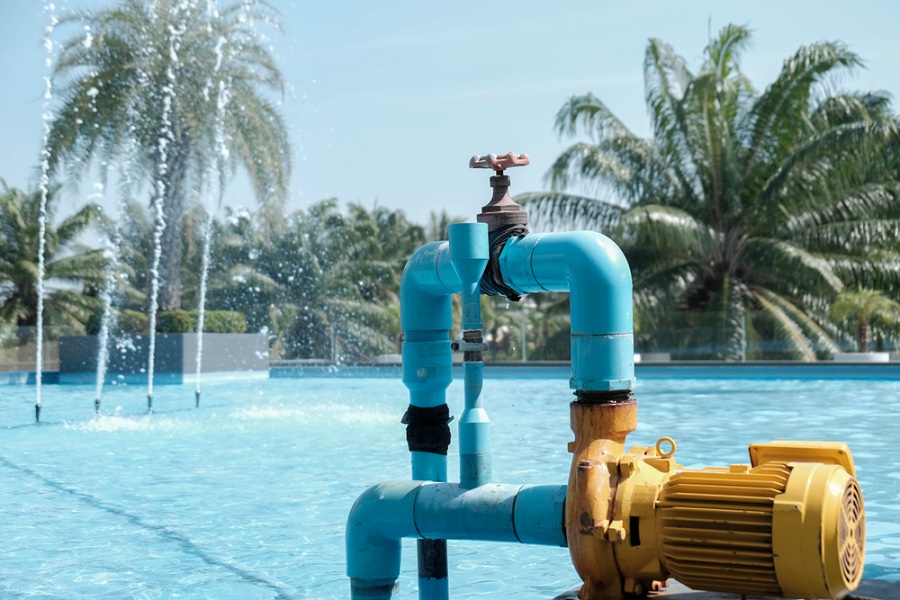
The filter removes dirt and debris from the water and removes biological material that feeds bacteria and viruses. Circulating the water through your pool filtration system also adds oxygen to the water, which further impedes the growth of biologicals.
Cleaning or replacing your pool’s filter regularly is the best way to keep your kids’ swim pool clean.
We recommend cleaning your pool filter at least once a month during the busy season.
Follow the manufacturer’s directions for changing or cleaning your filter.
6. Use Bacteria-Killing Chemicals As Needed
If you notice greenish-yellow stains on the surface of your pool, this could mean a bacterial infection in your pool. You don’t want your kids swimming in that until it is addressed.
Doing this is easy and inexpensive: adding the right amount of pool shock or another chlorine booster like bromoform will kill almost every type of bacteria in a kiddie pool.
7. Remove Pottie Accidents - And Shock The Pool
If one of the smaller kids has a number two accident, you need to get everyone out immediately due to the possibility of a coliform bacteria infection, which can be dangerous to small children.
Clean any visible signs from the water and add pool shock by following directions on the bag/bottle.
Run your pool pump/filter system continuously for the next 12 hours to thoroughly clean your filters and all water touching surfaces.
Then you should be good to go.
8. Check for Leaks
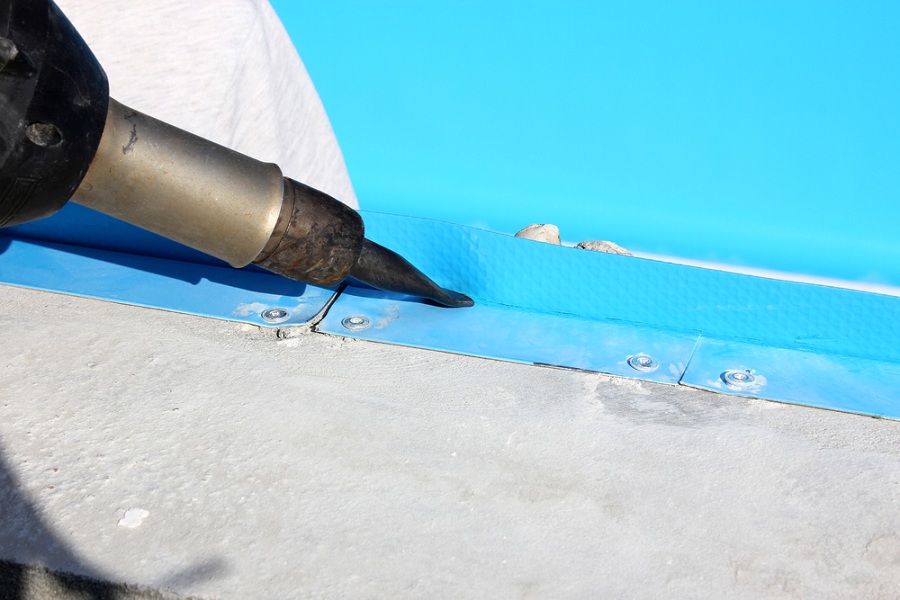
Leaky pipes and drains can cause dirty water to seep into your pool. Check around the perimeter of the pool for leaks. Look for cracks in the concrete, broken tiles, or holes in the liner.
Fix any leaks immediately.
9. Get Help From a Professional
A professional pool service company can provide many benefits.
They can install new equipment, repair damaged parts, and give advice on maintaining your pool.
10. Plan Ahead
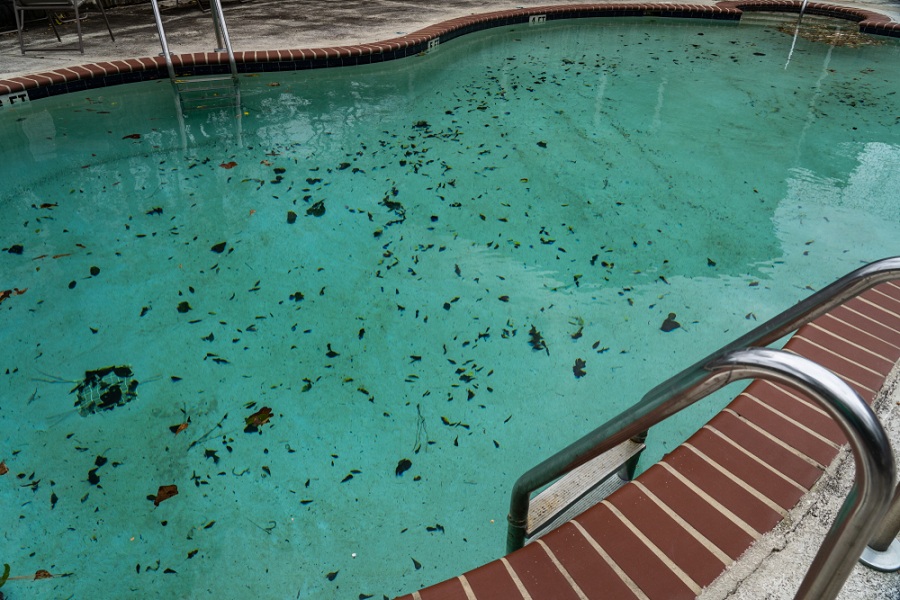
Plan ahead for spring cleaning.
Start by making sure all safety devices are working correctly.
Then do a thorough “season opening” pool cleaning before anyone steps in.
11. Don't Forget To Clean The Pool Gear
All kiddie pools have lots of toys, swim masks, floats, and other fun stuff to play with. Don’t forget to sanitize the gear every week or so.
The easiest way to sanitize pool gear is to first lay it out in the sun for an hour or two, then spray with a diluted bleach-water mix to wash the toys and rinse thoroughly.
Turn the toys over and repeat.
You’re done!
12. Maintain Your Pool System and Equipment
Don’t forget to check your pool pump, filter system, and automatic pool cleaners for signs of algae and biological contamination.
If you regularly pull your cleaner out of the water, ensure it is kept clean and in clean/dry storage space.
13. Talk to Other Parents
Talk to parents who have older kids about things you learned here.
14. Wear Sunscreen
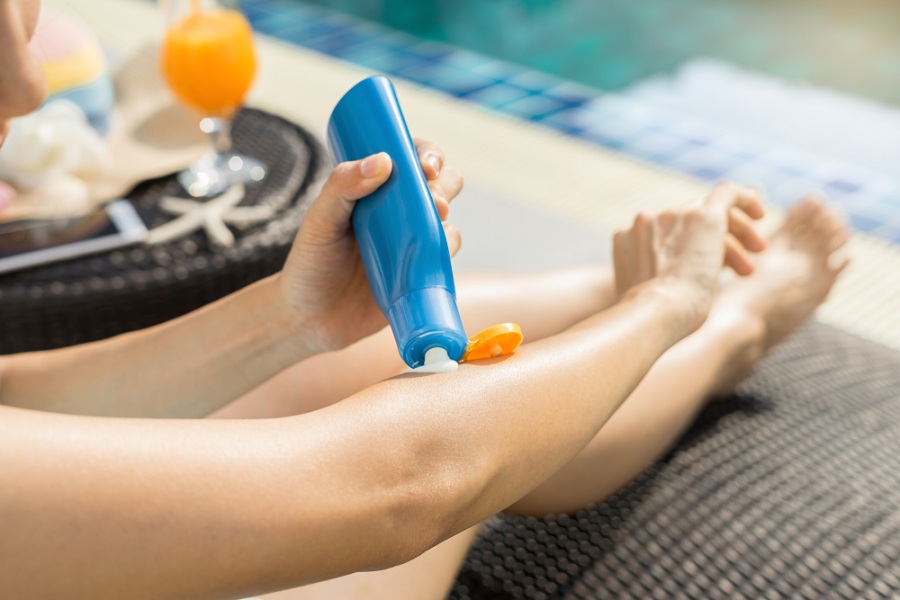
Wear sunscreen every day.
15. Watch Out For Leaks
Water leaks can sometimes cause problems with pool water health, especially if there is a chance that groundwater or sewage water exists underneath your pool piping.
If you suspect a leak, get a professional to test your lines and repair as needed.
Why YOU Should Clean Your Kiddie Pool (vs. Leaving It To Others)
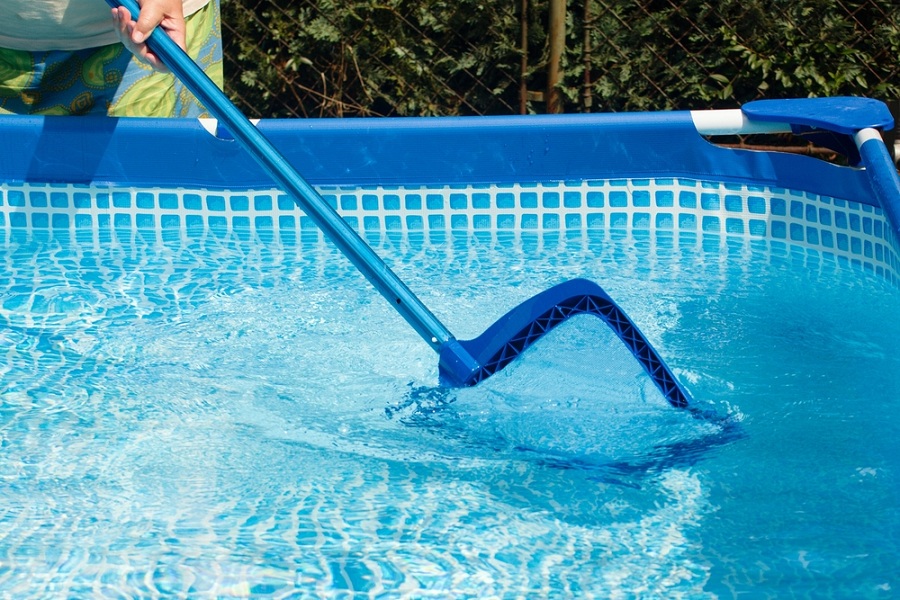
We recommend that until your youngest swimmer or guest is above age 10, you clean your pool yourself – or at least check the quality of work performed by your hired pool cleaner.
We say this because most homes with pools have older kids, teens and adults living in them, and pool cleaners tend to focus on the basics like sweeping and topping up chlorine.
As we’ve already noted, it’s always possible for anyone to miss a bacterial infection in your pool cleaning equipment if you’re not paying enough attention.
And, of course, potty accidents can remain in your pool for days until the pool guy visits next.
To minimize health risks to your kids, you’ll need to clean your pool yourself weekly or carefully inspect the quality of your pool water daily.
And there are several reasons why you should do this.
1. It's Easier Than Hiring Someone Else
You might not like the idea of hiring someone else to clean your pool.
You might worry that they’ll damage your pool.
Or you might even worry that they’ll try to cheat you out of money.
But when you clean your own pool, you don’t have to worry about these issues.
2. It's More Cost-Effective
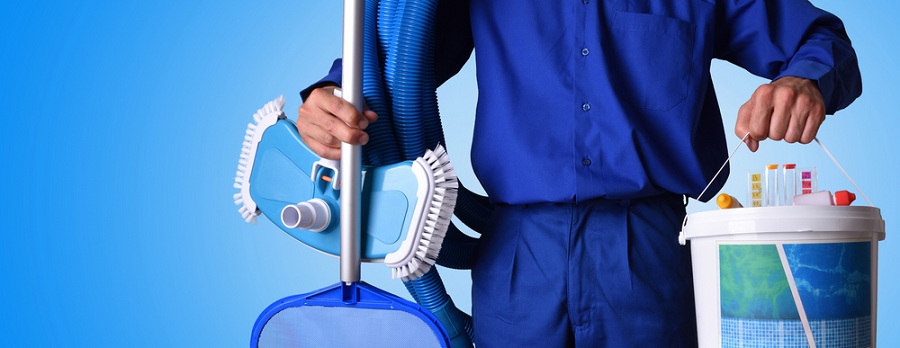
Hiring someone else to clean your kiddie pool might seem like an affordable option.
After all, you could hire them once and pay them less than $50.
But you’ll quickly find out that this isn’t actually true.
Because you’ll still need to buy supplies for cleaning your pool.
And you’ll also need to spend more time cleaning your pool.
3. It Makes Sure That You Get What You Paid For
When you hire someone else to clean your swimming pool, you’re taking a risk.
Because you don’t know exactly what kind of service you’ll receive.
And you’ll probably end up paying too much for the job.
But when you do it yourself, you can rest assured knowing that you’re getting the best possible service.
4. It Helps You Become Independent
Your family may tell you that you shouldn’t bother trying to clean your own pool.
They might say that you’re wasting your time.
But you should ignore them.
Because you’ll soon discover that you enjoy cleaning your pool.
It’s a great way to relax after a long day.
Plus, it gives you a chance to bond with your children.
5. It Helps You Teach Your Kids Responsibility
Get your kids involved early. Leverage the work.
By doing this, you learn how well you work together as a team and you teach your kids about pool safety.
6. It Gives Your Kids Something To Do In The Summer
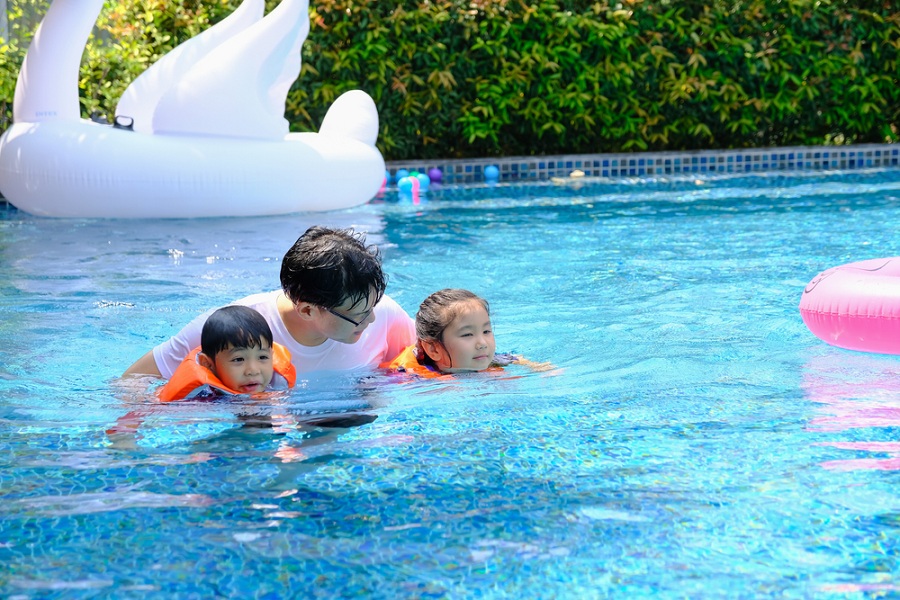
Many families struggle to find ways for their kids to fill their weeks.
Get your kids to help with vacuuming, sweeping, and cleaning the filter regularly. It’s not complex work.
7. It Will You Save Money
One of the biggest benefits of cleaning your pool is that it can save you money.
Because you won’t need to pay someone else to clean your pools.
8. You Will Notice The Little Things Before They Become Big
Another benefit of cleaning your own pool is you will notice changes more readily. This means your equipment and gear can be fixed before it breaks.
9. It Can Give You Some Extra Time With Your Kids
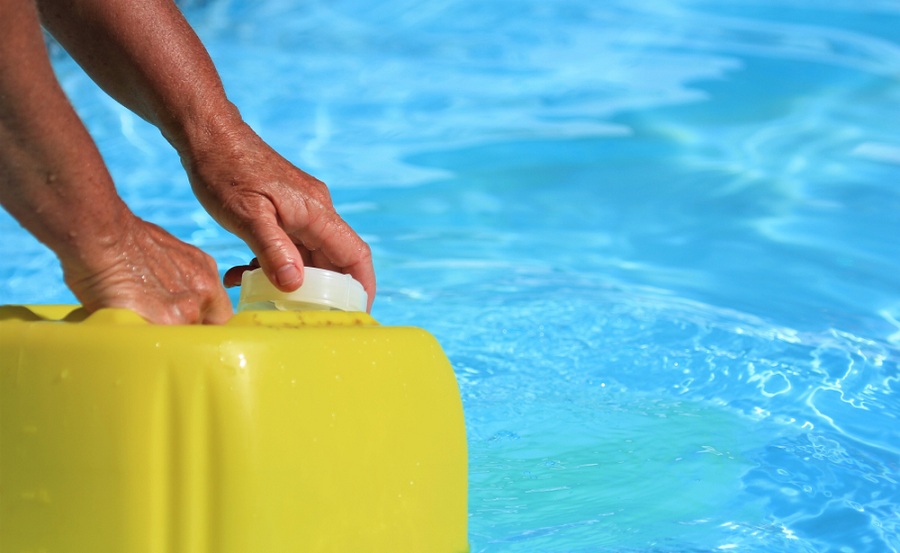
Cleaning your pool can give you some extra time with your kids.
10. It Can Be Fun
If you want to keep your pool looking good, then you’ll need to take care of it regularly.
11. It Will Increase Available Pool Time. Which Means Less Stress for Everyone.
In addition to giving you some extra time with the kids, cleaning your pool can reduce stress in your life.
If you know exactly how clean your pool is and everything is working fine, you won’t worry about inviting the neighbors’ kids over for a pool party.
12. It Can Improve Your Health

Finally, cleaning your own pool can improve your health.
Because you’ll spend less time sitting around watching TV or playing video games.
FAQs
Q: How often should I clean my pool?
A: There are no hard and fast rules, but we recommend cleaning your pool and checking pH and chlorine/salt levels at least once a week.
The best thing to do is to start by doing the basics weekly.
And gradually increase the number of things you check and clean during the first summer.
After that first season, you’ll be a pro.
Q: Will I damage my pool by cleaning it myself?
A: No. Pool cleaning is NOT a complex thing to master.
Most people who try to clean their kiddie pool themselves think they’ll never get things right and it’s all too much to manage. But it’s really not.
Q. What kind of chemicals should I use?
A: If you don’t know what type of chemicals to use, then call your local pool store. They’ll ask you to bring a sample bottle of your pool water and they’ll test it for free. Get your test results and discuss the purpose of each chemical with them.
Q: Are there any special tips for cleaning my pool?
A. Yes, there are lots of tips but only a few really matter – including:
- test your pool water chemicals and pH weekly
- keep your chlorine/salt levels within the recommended range
- brush and sweep your pool as needed to remove biological contaminants, including leaves, twigs, bugs, etc. An automatic pool cleaner and skimmers can help do most of the work unattended.
- clean your pool filter once a month during the high season
Q: Do I really need to clean my pool every week?
A: That depends on how dirty your pool is. But in general, yes, you will likely need to clean at least one aspect of your pool each week.
Some pools under trees require daily pool sweeping and cleaning, while others in dry/arid climates in the open sun can go weeks without being cleaned at all.
Q: Is it safe to swim in my pool after it has been cleaned?
A: Yes, with one caveat: if you recently shocked the pool or treated it with an algaecide or anti-biological treatment of any kind, then you should avoid swimming for 12-24 hours.
Swimming is perfectly safe in your pool even after it has been cleaned.
However, there are a few things you should consider before getting into the pool.
First, make sure that you’ve removed all debris from the bottom of the pool. This includes anything like leaves, toys, etc.
Next, you should make sure that the filter hasn’t clogged.
Q: Should I drain my pool before cleaning it?
A: This isn’t necessary. However, if you’re going to be doing any major repairs then you may need to drain your pool first.

